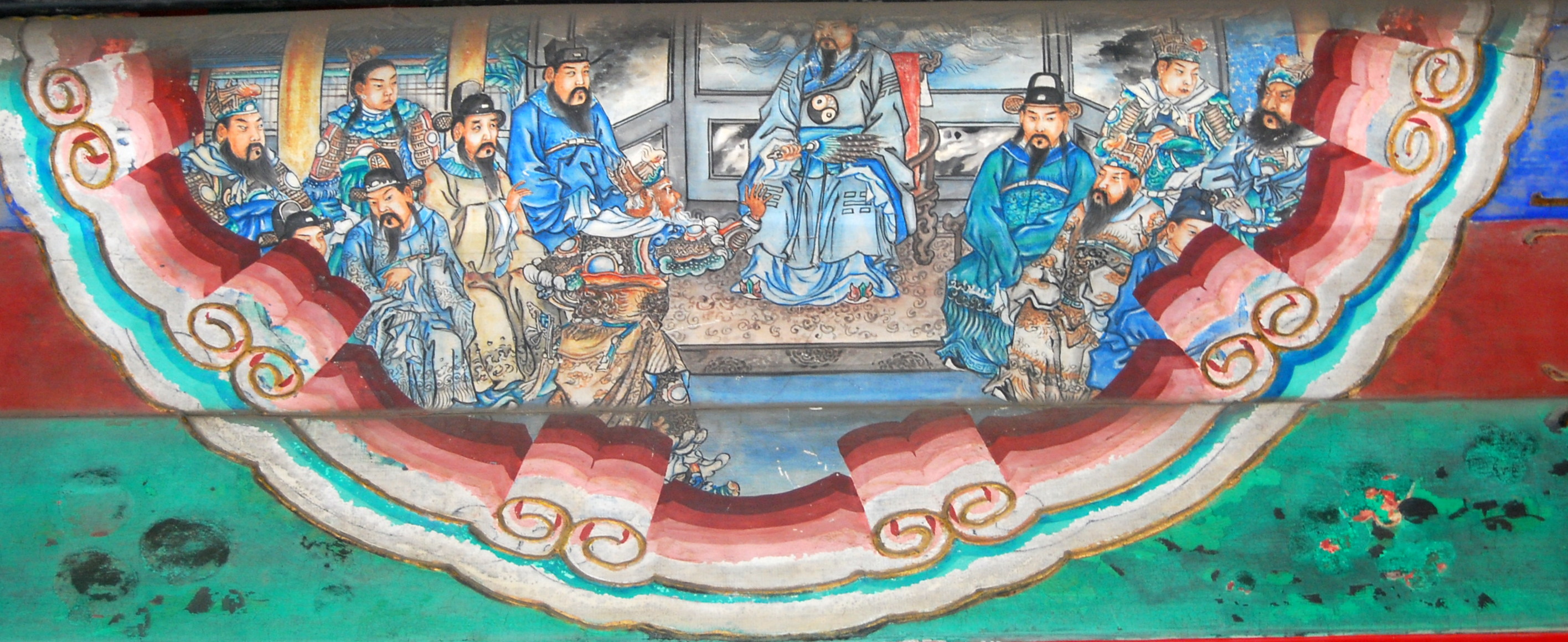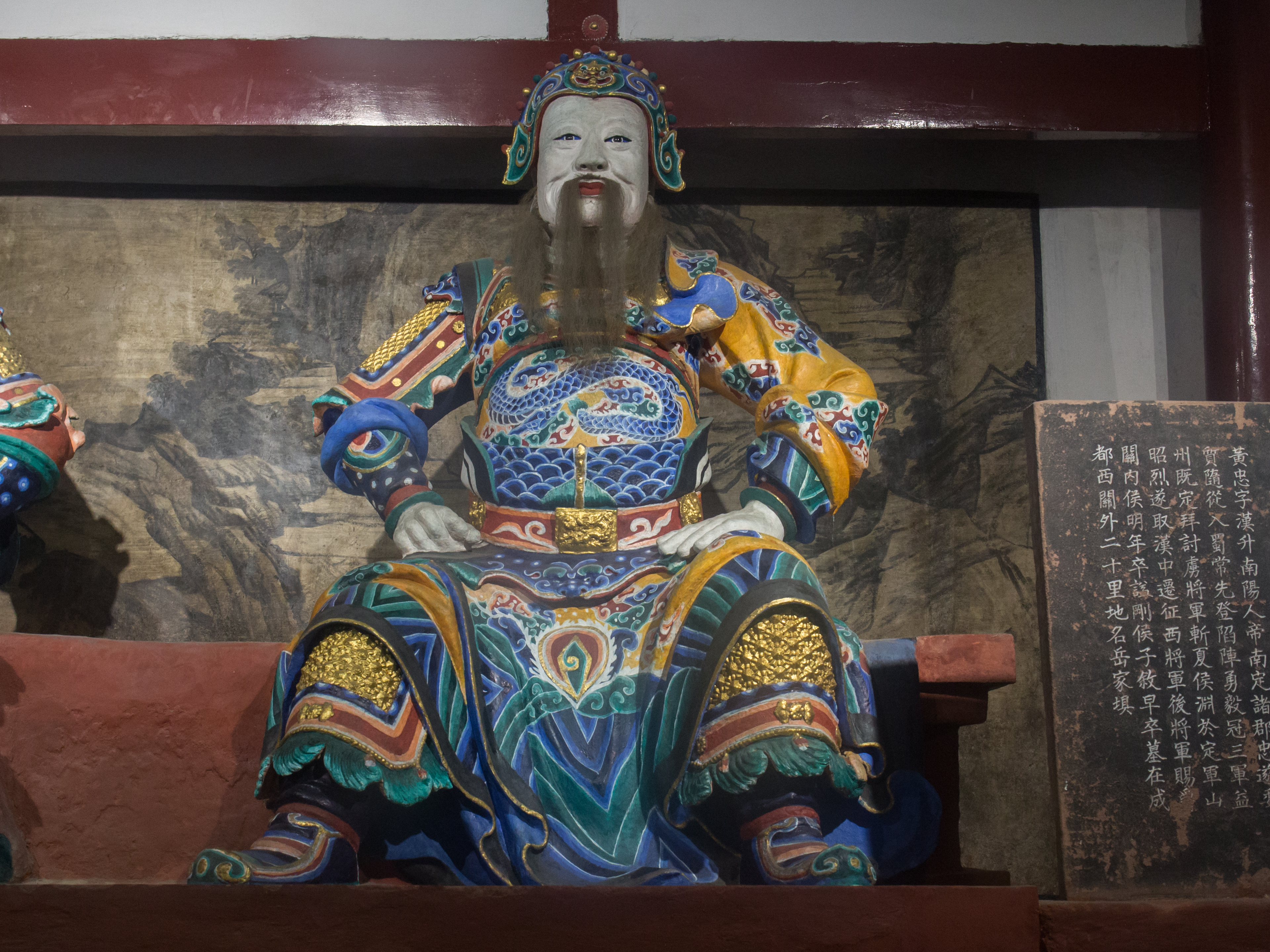1. Life and Career
Huang Zhong's life and military career spanned from his early service under regional warlords to his pivotal role in the establishment of the Shu Han state under Liu Bei, where he demonstrated exceptional bravery and strategic acumen in various campaigns.
1.1. Early Life and Service under Liu Biao
Huang Zhong was from Nanyang Commandery, located in present-day Nanyang, Henan. He began his military career serving as a General of the Household (中郎將) under Liu Biao, the Governor of Jing Province. He was assigned to defend You County in Changsha Commandery alongside Liu Biao's nephew, Liu Pan. Following Liu Biao's death in 208, his successor, Liu Cong, surrendered Jing Province to the warlord Cao Cao. Huang Zhong was subsequently appointed as an acting Major-General (裨將軍) and continued his service in Changsha under Han Xuan, the commandery administrator.
1.2. Joining Liu Bei and Yi Province Campaign
After Cao Cao's defeat at the Battle of Red Cliffs in 208, the allied forces of Liu Bei and Sun Quan gradually took control of the southern commanderies of Jing Province, including Changsha. Upon the fall of Changsha, Han Xuan surrendered, and Huang Zhong, along with Wei Yan, pledged allegiance to Liu Bei. Recognizing Huang Zhong's military capabilities, Liu Bei appointed him as a general in his army.
Huang Zhong accompanied Liu Bei into Yi Province (covering present-day Sichuan and Chongqing) during Liu Bei's campaign to conquer the region from Liu Zhang between 212 and 214. From his appointment at Jiameng (葭萌; present-day Zhaohua District, Guangyuan, Sichuan), Huang Zhong consistently distinguished himself. He was always among the first to charge into enemy formations, demonstrating unmatched martial prowess and bravery that resonated throughout the army. After the successful conquest of Yi Province, Huang Zhong was promoted to General Who Attacks Rebels (討虜將軍).
1.3. Hanzhong Campaign and Battle of Mount Dingjun
In 217, Liu Bei initiated a campaign to seize control of Hanzhong Commandery, a strategically vital region then under Cao Cao's control. Liu Bei's forces encountered fierce resistance led by Xiahou Yuan at Yangping Pass. The confrontation evolved into a prolonged stalemate lasting over a year.
The decisive moment arrived in 219 at the Battle of Mount Dingjun. One night, Liu Bei set fire to the barbed fence surrounding Xiahou Yuan's camp at the foot of Mount Dingjun. Alarmed, Xiahou Yuan dispatched Zhang He to defend the eastern flank while he personally guarded the south. Liu Bei's main force pressed hard against Zhang He, overwhelming him. Xiahou Yuan then sent a portion of his own troops to reinforce Zhang He. Seizing this opportunity, Huang Zhong, acting under the instructions of Fa Zheng, despite facing Xiahou Yuan's highly experienced soldiers, rallied his men. With thundering drums and impressive shouts, he led a swift and decisive charge down the mountain, catching Xiahou Yuan's forces off guard. The battle turned into a rout, and Huang Zhong personally engaged and killed Xiahou Yuan, reportedly splitting him in two. He also killed Zhao Yong, the Yi Province Inspector appointed by Cao Cao. This victory at Mount Dingjun was a crucial turning point, paving the way for Liu Bei's conquest of Hanzhong. For his significant contributions in the Hanzhong Campaign, Huang Zhong was promoted to General Who Attacks the West (征西將軍).
1.4. Appointments and Titles
In the same year, following the conquest of Hanzhong, Liu Bei proclaimed himself "King of Hanzhong" (漢中王). He intended to appoint Huang Zhong as General of the Rear (後將軍), a rank that would place him on equal footing with three other senior generals: Guan Yu, Zhang Fei, and Ma Chao. However, Zhuge Liang expressed reservations to Liu Bei, noting that Huang Zhong's reputation was not traditionally on par with Guan Yu and Ma Chao. Zhuge Liang reasoned that while Zhang Fei and Ma Chao, having witnessed Huang Zhong's contributions firsthand, might not object, Guan Yu, stationed far away in Jing Province, might be displeased with such an arrangement. Liu Bei responded, "I will handle this myself," and dispatched Fei Shi to inform Guan Yu of the appointments. Indeed, Guan Yu initially complained about Huang Zhong being appointed to an equal rank, but Liu Bei persuaded him by explaining Huang Zhong's feat of killing Xiahou Yuan. Ultimately, Liu Bei elevated all four generals to the same status. Huang Zhong also received the title of a Secondary Marquis (關內侯). His posthumous title, awarded in October or November 260 by Liu Shan, was "Marquis Gang" (剛侯), meaning "unyielding marquis."
2. Appraisal
Chen Shou, the author of the Records of the Three Kingdoms (Sanguozhi), offered a concise yet powerful appraisal of Huang Zhong. He commented that Huang Zhong and Zhao Yun were "fierce and mighty warriors, just like claws and teeth," and pondered if they were the successors to figures like Guan Ying and Xiahou Ying, renowned generals of the early Han dynasty. This comparison highlights Huang Zhong's exceptional combat prowess and his vital role as an indispensable asset to Liu Bei's military. Additionally, the Ji Han Fuchen Zan, a text appended to the Sanguozhi, describes Huang Zhong as a "man of deep righteousness," further emphasizing his moral character alongside his military capabilities.
3. In Romance of the Three Kingdoms

Huang Zhong is a prominent and highly romanticized character in Luo Guanzhong's 14th-century historical novel Romance of the Three Kingdoms. In the novel, he is depicted as an elderly warrior, often stated to be over 60 years old, yet possessing youthful vigor, immense strength, and exceptional skill in archery. He is famously included as one of the Five Tiger Generals appointed by Liu Bei after the Hanzhong Campaign.
3.1. Portrayal and Major Fictional Events
The novel significantly expands upon Huang Zhong's historical exploits, adding dramatic and often fictionalized events that have cemented his legendary status.
His first major appearance in the novel is during the fictional Battle of Changsha, where he serves under Han Xuan. When Guan Yu leads Liu Bei's forces to conquer Changsha, Huang Zhong engages him in a series of duels. Despite his age, Huang Zhong fights Guan Yu to a standstill, demonstrating his formidable martial arts. In one encounter, Huang Zhong's horse stumbles, leaving him vulnerable, but Guan Yu chivalrously spares his life, stating his sword does not kill old men or the young. Grateful for this act of kindness, Huang Zhong repays the favor in a subsequent duel by intentionally shooting an arrow that only hits Guan Yu's helmet string, rather than killing him. This act of mercy leads Han Xuan to suspect Huang Zhong of treachery and order his execution. However, Wei Yan intervenes, leading a rebellion against Han Xuan, killing him, and opening the city gates to Liu Bei's forces, thus saving Huang Zhong. Despite his initial reluctance due to his loyalty to Han Xuan, Huang Zhong is eventually persuaded by Liu Bei's sincerity and virtue to join his cause.
In the Hanzhong Campaign, the novel portrays Huang Zhong's role in the Battle of Mount Dingjun with heightened drama. He is depicted as taking the lead, often in partnership with another elderly general, Yan Yan. During the battle, Huang Zhong is said to have personally engaged and killed Xiahou Yuan with a single, powerful blow that splits him in two, a more dramatic depiction than historical accounts. The novel also adds details of Huang Zhong's subordinates, Chen Shi, engaging Xiahou Shang, and the strategic guidance of Fa Zheng in the fictionalized battle. Furthermore, in the Hanzhong campaign, Huang Zhong is depicted as killing Han Hao, who is portrayed as Han Xuan's brother and seeking revenge.
The novel also extends Huang Zhong's life beyond his historical death in 220 AD, having him participate in the Battle of Xiaoting (also known as the Battle of Yiling) in 222, where Liu Bei seeks revenge against Eastern Wu for Guan Yu's death. During this campaign, Liu Bei expresses concerns about the effectiveness of older generals, which motivates Huang Zhong. Despite being 75 years old in the novel, Huang Zhong leads a small contingent to attack Pan Zhang's camp. He displays incredible bravery, killing Pan Zhang's subordinate, Shi Ji, and fighting fiercely. However, he is ambushed by Zhu Ran, Han Dang, and Pan Zhang's forces, and is struck by an arrow fired by Ma Zhong in the shoulder. He is rescued by Guan Xing and Zhang Bao but succumbs to his wounds later that night in Liu Bei's presence. Liu Bei expresses deep regret, acknowledging that his earlier words contributed to Huang Zhong's fatal charge.
Huang Zhong's portrayal in the novel as an "old but strong" warrior has led to the popular Chinese idiom "Lao Huang Zhong" (老黃忠Lǎo Huáng ZhōngChinese), used to describe an elderly person who remains vigorous and capable.

4. Personal Life
Historically, information about Huang Zhong's personal life is limited. He had a son named Huang Xu (黃叙Huáng XùChinese). However, Huang Xu died at a young age, before his father, and consequently, Huang Zhong had no descendants to carry on his family line.
5. Death and Posthumous Honors
Huang Zhong died in July 220 AD. The exact cause of his death is not specified in historical records; some sources suggest illness, while others imply he may have fallen in battle. He was posthumously honored in October or November 260 by Liu Shan, Liu Bei's successor, who bestowed upon him the title "Marquis Gang" (剛侯), meaning "unyielding marquis."
Huang Zhong's tomb was first discovered in Chengdu during the Qing dynasty in 1825. The tomb was subsequently repaired, and a temple dedicated to him was constructed nearby. However, during the Cultural Revolution, the temple, its statues, plaques, and the tomb itself were heavily damaged, and the coffin was emptied.
6. In Popular Culture
Huang Zhong's enduring legacy has led to his frequent appearance in various forms of modern popular culture:
- He is featured as a playable character in several video game series by Koei, including Dynasty Warriors, Kessen II, and Warriors Orochi.
- He also appears in the Capcom game Destiny of an Emperor, released for the original Nintendo Entertainment System.
- Huang Zhong is a potential skin for the character Hanzo Shimada in the video game Overwatch, released in 2019 as part of the Chinese New Year event "Year of the Pig."
- He is a playable character in Total War: Three Kingdoms, initially serving under Liu Biao's faction.
- Huang Zhong is featured on a card in the Three Kingdoms Portal set of the card game Magic: The Gathering.
- The Hon Hsing Athletic Club of Vancouver, British Columbia, a Chinese-Canadian youth organization and martial arts club specializing in traditional Chinese cultural arts, was established in 1939 under the patronage of the Wongs' Benevolent Association of Canada. It is named after Huang Zhong's courtesy name, Hansheng (漢升; Cantonese: Hon Hsing).
- USS Huang Zhong is the name of an Archer-class scoutship that appears in the Star Trek novel That Which Divides, by Dayton Ward.
